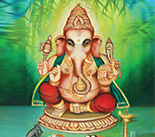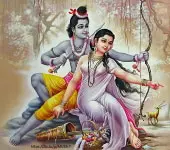This discourse tells you about the qualities of the ministers of Dasharatha and their administrative skills.
On the banks of which river is Ayodhya?
Ayodhya is on the banks of the famous Sarayu river. Sarayu is also known as Ghaghara.
Which are the sister cities of Ayodhya?
1. Janakpur in Nepal- Ayodhya is the birthplace of Lord Rama and Janakpur is the birthplace of Seetha Devi. 2. Gimhae in South Korea- Ayodhya being the birthplace of the famous queen Heo Hwang-ok.
Quiz
According to scriptures, who or what protects Ayodhya ?Transcript
(Click here to read more)
Why did Lord Rama choose to take birth as the son of Raja Dasharatha and Ayodhya as his birthplace? We have already seen this. The state of Ayodhya at the time of the Lord's birth, the glory of Ayodhya, and also the qualities of Dasharatha whom he chose to be his father. Dasharatha's kingdom was a model kingdom famous in all the three worlds. A king needs the support of able ministers and advisers to run his kingdom. Nobody will be able to do this alone. Ramayana gives a description of the ministers and a....
Transcript
(Click here)
Why did Lord Rama choose to take birth as the son of Raja Dasharatha and Ayodhya as his birthplace?
We have already seen this.
The state of Ayodhya at the time of the Lord's birth, the glory of Ayodhya, and also the qualities of Dasharatha whom he chose to be his father.
Dasharatha's kingdom was a model kingdom famous in all the three worlds.
A king needs the support of able ministers and advisers to run his kingdom.
Nobody will be able to do this alone.
Ramayana gives a description of the ministers and advisers of Dasharatha, their qualities and capabilities, also his purohitas.
The ministers knew how to gather information meant for decision making.
They could read facial expressions and body language of people and understand their real intentions.
Dasharatha had eight ministers.
This is again as per dharma shastra.
Manu smriti says-
मन्त्रिणः सप्त वा अष्टौ वा प्रकुर्वीत परीक्षितान्
Dasharatha is ruling his kingdom following Kshatriya dharma as given in the dharma shastra, not as per his own whims and fancies.
The ministers were clean, they had clean mind, and absolute loyalty to the king.
Passionate about what they were doing.
The names of these eight ministers were:
धृष्टिर्जयन्तो विजयः सिद्धार्थो ह्यर्थसाधकः।
अशोको मन्त्रपालश्च सुमन्त्रश्चाष्टमोऽभवत्॥
Dasharatha had two purohitas- Vasishta and Vamadeva, both great Rishis.
They were the main ones.
Then there were others like Jabali.
Ministers also there were many more to assist the main eight ministers.
The ministers were well versed in Administrative Science.
They refrained from everything that could cause them the slightest ill repute.
Very tactful, quite capable of adopting strategy as the situation demands.
Very intelligent with absolute control over their mind and senses, wealthy, brave.
Never went back on their words.
There are those who will have something in the mind, they will speak something else, and act in a different way.
Ministers of Dashratha were straightforward.
They were powerful but were also tolerant.
Never misused their power.
When they spoke they had smile on their faces.
Between them, there was no competition.
Absolutely truthful.
Never uttered a lie, either out of anger, or selfishness, or for getting something done.
Through spies, they kept track of everything that happened in their country and also other countries.
Their dealings were well organized, disciplined, and systematic.
They would mete out punishment even if it is their son who commits an offense.
Absolutely impartial.
They managed the finance very well, ensuring steady flow of revenue.
They kept the army up to date and well equipped.
Even if it is an enemy, if he is innocent they will never harm him.
Very vigilant in protecting the subjects from enemies
Very capable in defeating enemies.
Even in punishment, they looked at the gravity of the offense as well as the physical strength of the offender.
For light offense, light punishment.
For grave offense, severe punishment.
That too they saw the physical strength of the recipient of the punishment before deciding the quantum of the sentence.
Because of the capability of the ministers, people largely refrained from dishonesty.
There were very few offenders.
There were no cheats, no harassers.
No one was immoral.
The ministers knew diplomacy.
Knew when to compromise and when not to relent.
They kept administrative secrets well protected and shared information only on need to know basis.
Capable subtle analysis of information.
Very soft-spoken.
With the help of these able ministers, Raja Dasharatha ruled his kingdom.
And of course, he was anagha, devoid of vices.
What are the vices?
There are ten vices coming out of desire
and eight out of anger.
मृगायाक्षोदिवास्वापः परिवादः स्त्रियोमदः।
तौर्यत्रिकंवृथाष्ट्याचकामजोदशकोगुणः॥
पैशुन्यंसाहसंद्रोहईर्ष्यासूयार्थदूषणे।
वाग्दण्डनंचपारुष्यंक्रोधजोपिगुणोष्टकः॥
Vices arising out of desires are: hunting, gambling, sleeping during the day- basically laziness, gossiping, womanizing, liquor, addiction to dancing-singing-and playing musical instruments, and unwanted travel.
Vices arising out of anger are: wickedness, unwanted taking of risk, cruelty, jealousy, finding fault with others, harsh words, extravagance, and rough behavior.
Dashratha's subjects were happy.
He was kind and generous.
He didn’t have an enemy who was bigger than him or equal to him.
His generosity won the friendship of the samanta kings.
But whoever obstructed his path, he defeated and removed them.
In this manner, Dasharatha ruled Ayodhya as brilliant as the rising Sun.
Recommended for you
Uttara Bhadra Nakshatra Features

Uttara Bhadra Nakshatra -Characteristics, suitable career, health issues, remedies, lucky stone, favorable colors, mantra, marriage........
Click here to know more..Matsarasura ridicules even Lord Shiva and attacks Kailasa
 Click here to know more..
Click here to know more..
Diwakara Panchaka Stotram

atulyaveeryammugratejasam suram sukaantimindriyapradam sukaantidam. kri'paarasaika- poornamaadiroopinam divaakaram sadaa bhaje subhaasvaram. inam mahe....
Click here to know more..
English Topics
Ramayana
Click on any topic to open
- 50 Janaka's Spiritual Evolution - From Jnana to Bhakti
- 49 Dasharatha's Grief Decoded
- 48 Shiva burned Kamadeva at Chhapra, Bihar
- 47 Motherhood brilliance - Kausalya Supraja Rama
- 46 Bala and Atibala Mantras - Sriram Ji will unfold their superpower
- 45 Dasharatha Pleads With Vishwamtra Not To Take Away Young Sriram Ji
- 44 Abandoning Of Sita Devi - Is It Justifiable?
- 43 Vishwamitra Wants To Take Young Sriram Ji With Him
- 42 Position Of Sages In Ancient Bharata
- 41 Horoscope of Sriram Ji
Please wait while the audio list loads..
30
Ganapathy
Shiva
Hanuman
Devi
Vishnu Sahasranama
Mahabharatam
Practical Wisdom
Yoga Vasishta
Vedas
Rituals
Rare Topics
Devi Mahatmyam
Glory of Venkatesha
Shani Mahatmya
Story of Sri Yantra
Rudram Explained
Atharva Sheersha
Sri Suktam
Kathopanishad
Ramayana
Mystique
Mantra Shastra
Bharat Matha
Bhagavatam
Astrology
Temples
Spiritual books
Purana Stories
Festivals
Sages and Saints
